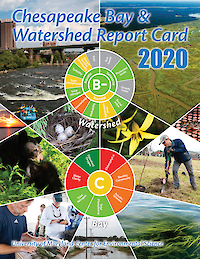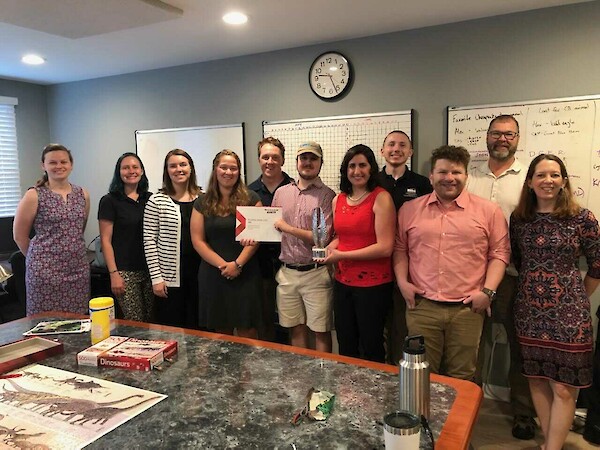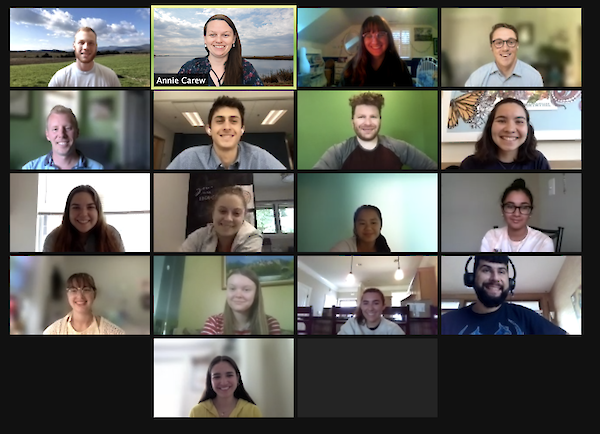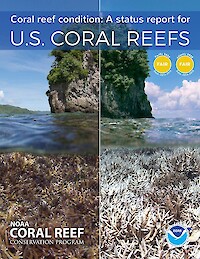Now available: 2020 Chesapeake Bay and Watershed Report Card

The 2020 Chesapeake Bay and Watershed Report Card was released on June 22 in person at Sandy Point State Park. The Bay itself received a moderate score (C), a slight increase from 2019. The Chesapeake Watershed was scored separately, including several new socioeconomic indicators, and received a good score (B-). The new indicators included protected lands, and the socio-economic indicators stewardship, walkability, and heat vulnerability index. The new socio-economic indicators attempt to address the question of equity in the Chesapeake Bay Watershed. Underprivileged and underserved communities are more vulnerable to adverse environmental impacts. We are committed to improving Chesapeake Bay environmental and socio-economic health. It is vital to incorporate equity and justice into environmental management.
Despite the tumult of 2020, the essential work of monitoring the Chesapeake Bay and Watershed continued. We are grateful to our partners and staff whose hard work made this report card possible. Visit ecoreportcard.org to view the full report card and learn more about the indicators and process.
We're hiring!

We are currently seeking applicants for our science communication internship. This internship is targeted to graduate or advanced undergraduate students with backgrounds in science and communication. A degree in biology, environmental science, or related field is required. Interns are expected to work with a variety of software packages including Adobe Creative Suite, Microsoft Office, and GIS applications. Training will be provided, but familiarity with these products is preferable.
The science communication intern will have multiple duties depending on their qualifications and interests. Tasks may include:
- editing text, photos, and videos,
- creating new vector images and conceptual diagrams
- conducting data analysis with Excel and R
- plotting spatial data and preparing maps
- creating print-ready InDesign documents
- working with media outlets such as Facebook, Twitter, YouTube, Vimeo, etc.
- creating high quality videos with After Effects and Adobe Premiere Pro
This is a contractual, hourly appointment. The chosen candidate will receive a competitive hourly wage and subsidized healthcare benefits may be available depending on number of hours worked. Additionally, interns will gain valuable skills in science communication, including desktop publishing, spatial analysis, environmental assessment, and effective communication. The team provides a dynamic, fun, and exciting atmosphere, as well as a chance to work on some of the most pressing local, national, and global environmental problems.
This position will be located in Cambridge, Maryland or Annapolis, Maryland, based on the needs of the team. Send applications to afries@umces.edu by July 9th, 2021.
Developing a framework for an Environmental Justice Index in the Chesapeake Bay Watershed

Environmental justice requires providing fair treatment and meaningful involvement of all people, regardless of race, color, national origin, or income, with respect to the environment. The Marine, Estuarine, & Environmental Science graduate program within the University System of Maryland sponsors a suite of unique Issue Study Group courses in which students, faculty, and staff from a variety of campuses collaborate to develop tangible products. This newsletter summarizes the findings of a course entitled “Developing an Environmental Justice Index for the Chesapeake Bay Watershed Report Card,” conducted in spring 2021. In addition to this newsletter, blog posts were written and a video was produced.
Teaching summer scicomm courses

This month, some of our science communicators (aka scicommers) taught multiple virtual classes to summer interns at IMET and Maryland Sea Grant. Each course consisted of two sessions focused on the basics of scicomm, principles of design, and an introduction to Adobe Creative software.
We like to emphasize the importance of science as storytelling. No matter your system, experiment, or situation, there is an intrinsic narrative that you can use to make your science engaging to any audience. Finding the narrative, and tailoring it to your audience, is the basis of good science communication. We use tools like ABT statements (And, But, Therefore) and conceptual diagrams to communicate science to a variety of audiences, and it is always enjoyable for us to pass on those skills to younger scientists.
We thoroughly enjoyed our students this summer, and we wish them luck in the rest of their internships!
Three IAN report cards received Hermes Creative Award

"The Hermes award is an international awards competition of approximately 6,000 entries for creative professionals involved in the concept, writing, and design of traditional and emerging media. Hermes Creative Awards recognizes outstanding work in the industry while promoting the philanthropic nature of marketing and communication professionals. The Platinum award is the highest-level designation, and the three UMCES campaigns reached over 700 million people in watershed communities." (Associated Press)
The three projects highlighted by this award are the Coral Reef Condition Status Reports, the 2019 Chesapeake Bay Watershed Report Card, and the Western Lake Erie 1st Report Card. We are proud to share this award with our partners at Yes& Agency, and are deeply grateful to all of our staff who made these projects possible.